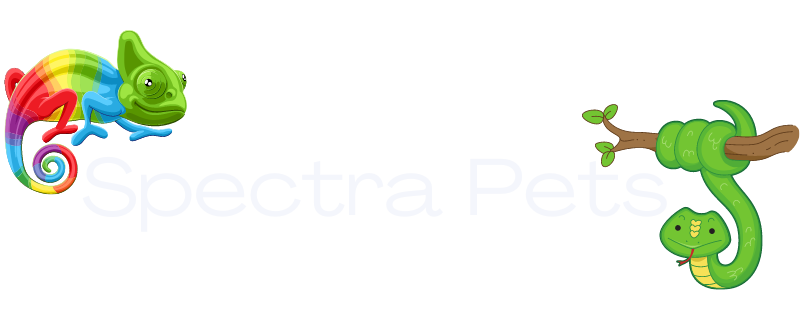Owning a pet is no easy task, as you have to take a lot of things into account. Not only do you have to deal with the health and well-being of your pets, but you also have to deal with their emotional needs. Axolotls, being an exotic kind of pet, also need to be taken care of in terms of their mental health. This is why you need to know about their personalities.
So, do axolotls have personalities? Yes, considering they are an aquatic pet type, they have a range of personalities. Axolotls display distinct behavioral patterns that, akin to human personality traits, remain consistent over time and across different situations. This consistency of behavior, studied and documented by institutions like the University of Vienna, indicates the existence of distinct personality types among axolotls.
This article unfolds the rich tapestry of axolotl personalities, their behavioral spectrum, and how environmental factors can influence these behaviors. It discusses how axolotl owners can cater to their pet’s unique personality, and how these personalities may change over time. Additionally, we will explore how the axolotl’s fascinating personality traits compare with those of other aquatic species. Expect a voyage through an underwater world where each axolotl tells its own tale of bold exploration, shy retreat, or laid-back lounging.
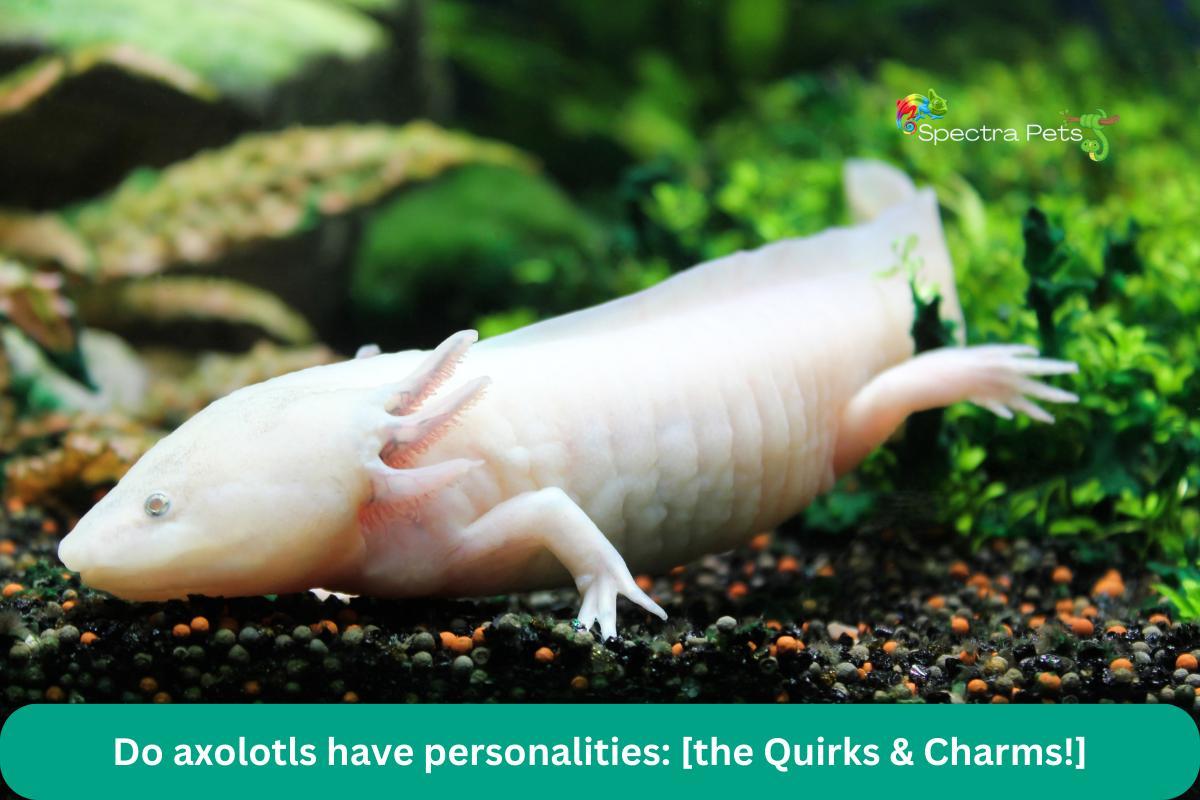
Does my axolotl have any personality?
All animals, no matter how small they are, have personalities. This aspect becomes even more important when it comes to pets, as the welfare of your pets depends largely on how well you deal with their personality.
There is a common misconception that aquatic pets have the least personality among all the pets people own. While some pets such as fish are not known for their personalities, exotic pets such as axolotls are full of it.
While they may not be the most expressive and active aquatic pets you will have, axolotls show signs of a moderately large range of personalities. Some axolotls are more active than others, while some axolotls display an increased sign of behavior than other animals.
What Defines the Unique Personality of an Axolotl?
Ever watched an axolotl just chilling in an aquarium? One minute they’re calm as a millpond, the next, darting around like a torpedo. Now, wouldn’t you call that a sort of “personality”?
To unravel the enigma, scientists have plunged into behavioral research, inspecting their every flip and flop. Unsurprisingly, these charming amphibians have been found to exhibit distinct behaviors. Whether it’s their reaction to a novel toy or food, each axolotl seems to respond in its unique way.
But hold your horses! Can we call these behaviors a “personality”? Let’s take a closer look.

Concept of Axolotl Personalities
In human context, we often think of personality as an amalgam of characteristics that define our responses to various situations. But, in the axolotl world, things are different, yet strikingly similar. Their personality can be described as their consistent behavior over time and across different situations.
For instance, an axolotl might always tend to hide when a new object is introduced into its habitat, signaling a more cautious personality. In contrast, another might approach the object with curiosity, indicating a bolder personality.
How the Behavior of Axolotls Suggests Distinct Personalities
According to a study conducted by the University of Vienna, axolotls showed consistent differences in their response to new environments and objects, hinting towards a distinction in personalities. For instance, some were found to be explorers, readily investigating new additions, while others were more the ‘homebody’ type, avoiding novelty.
Factors Influencing Axolotls’ Personality
Much like us, axolotls’ behavior is also significantly influenced by their environment. Variations in habitat conditions, diet, and interactions can shape the axolotl’s behavior and, subsequently, its personality.
Here are the factors that can determine your axolotls’ personality:
1. Living conditions
The living conditions of your axolotls play a big part in influencing the personality of your axolotls. Animals that live in ideal living conditions and an enriched environment are a lot more active than those that don’t. They are also healthier than other axolotls, which makes sure they are active and playful.
2. Social Interactions
Another big factor that determines how much of a personality an axolotl will show is its social interaction. Although axolotls are mainly solitary animals, they can coexist with others of their kind, depending on the situation.
If you keep an axolotl by itself in an aquarium, its behavior will be entirely different from that of an axolotl that lives with others. Sometimes these social interactions can develop into aggression, so keep a close eye on that.
3. Feeding
The time you feed your axolotls, what you feed them, and how much food you give them is a big factor in your axolotls’ personalities. A well and regularly-fed axolotl will be more active than one that isn’t.
If you regularly feed your axolotl and in the appropriate manner, they will show more signs of a personality. They will also be more energetic than the rest of the animals.
4. How they are handled
The way you handle your axolotls has a big impact on your axolotls’ personalities. If you gently handle your axolotls, they will have a higher level of trust in you. This will reduce their stress level, and they will be more active and energetic.
On the other hand, if you roughly handle your axolotls, they won’t trust you very much. As a result, they’ll be defensive around you, causing them to be stressed and skittish.
5. Genetics
Genetics is a big factor in determining every character trait of an animal, including axolotls. If their parents were active and had more personality, the offspring will also most likely have the same. The offspring of an active axolotl will be active, while the chances of the offspring of an axolotl that likes to sit around all day to be inactive are pretty high.
6. Age
The personalities of axolotls change as they age and develop. For example, infant axolotls are more active and playful. As they grow up, their activity level goes down, and they become more settled and less curious. So, if you see that your axolotl has become less active than when it was a youngling, there’s no need to worry at all.
How Do Axolotls Express Their Unique Personalities?
Axolotls, despite their seemingly simple life in a tank, showcase unique personalities through several behaviors. An axolotl’s personality can be expressed through eating habits, activity levels, interactions with tank mates, and how they respond to their human caretakers. Here’s a deep-dive into these indicators:
- Eating Habits: Some axolotls are aggressive eaters, charging at food the moment it’s introduced to the tank, while others are more conservative, waiting for the food to settle before calmly approaching it. Their voraciousness can also vary from day to day.
- Activity Levels: This is another area where individual axolotls showcase their personality. Some axolotls enjoy exploring their tank, often cruising around and investigating every nook and cranny. Others may be content just staying in one place or hiding under the rocks most of the time.
- Interaction with Tank Mates: The way axolotls interact with their tank mates can also reveal a lot about their personality. Some axolotls prefer solitude, while others seem to enjoy the company of other axolotls.
- Response to Human Interaction: Some axolotls seem to enjoy human interaction more than others. They may come to the glass when a human is present, seeming to recognize their owner. Others may hide or display signs of stress during human interaction.
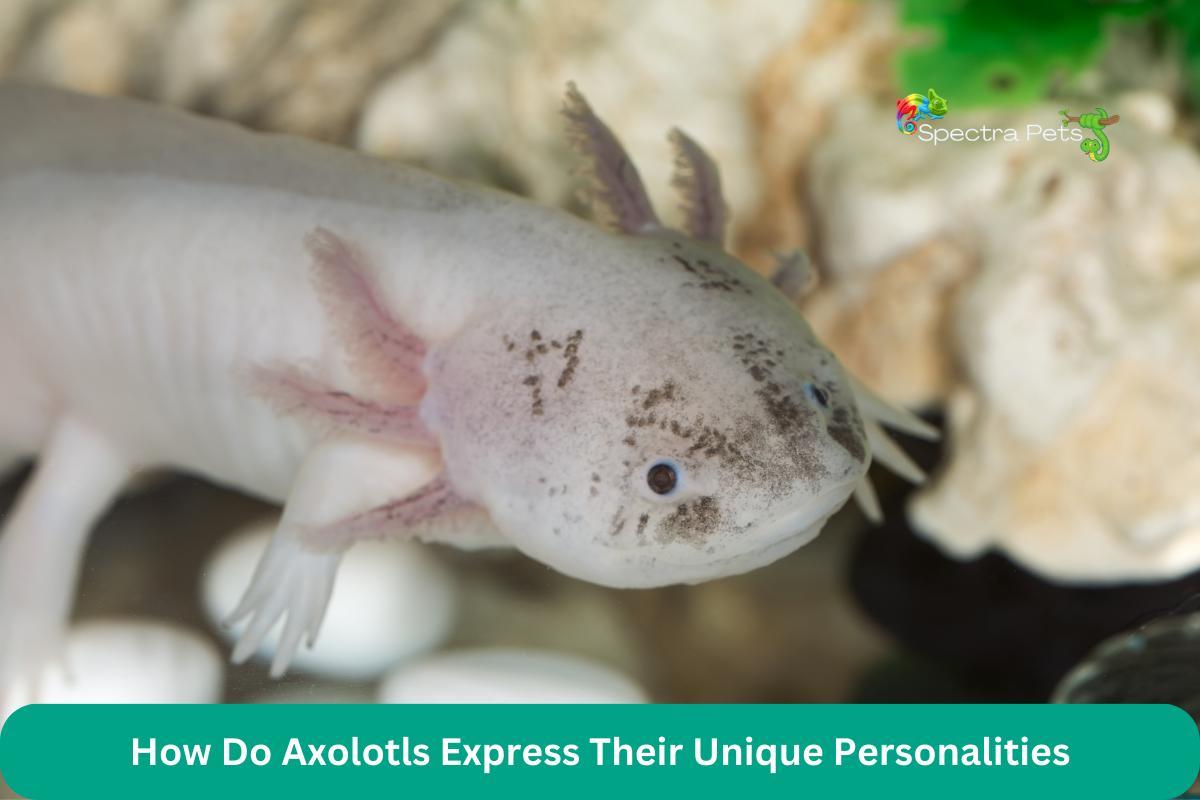
Are There Distinct Personality Types Among Axolotls?
While axolotl personalities are diverse and unique to each individual, they can generally be classified into three main types: the active explorer, the shy hider, and the indifferent observer.
- The Active Explorer: This type of axolotl is often seen swimming around their tank, curious about their surroundings. They’re typically eager eaters and may even seem to interact with their owners.
- The Shy Hider: These axolotls are more reserved and prefer to hide most of the time. They might be slower eaters and might seem less interested in human interaction.
- The Indifferent Observer: This personality type doesn’t seem to care much about what’s happening in their tank or outside. They’re not particularly active, but they don’t shy away either.
- Playful Ones: Last but not least, these are the entertainers, always on the move, engaging with their environment in a playful manner.
How Does The Axolotl’s Personality Affect Its Interaction With Humans?
The personality of an axolotl plays a significant role in its interaction with humans. Active and exploratory axolotls are more likely to engage with their owners and may exhibit behaviors such as following fingers outside the tank or approaching when they see their owner. On the other hand, shy or indifferent axolotls may not interact much with their owners, and they may even retreat or show signs of stress during attempts at interaction.
Understanding an axolotl’s personality is crucial for an owner to ensure they’re providing the right kind of care and environment. For instance, more active axolotls may benefit from a larger tank with plenty of room to explore, while a shy axolotl may prefer more hiding spots.
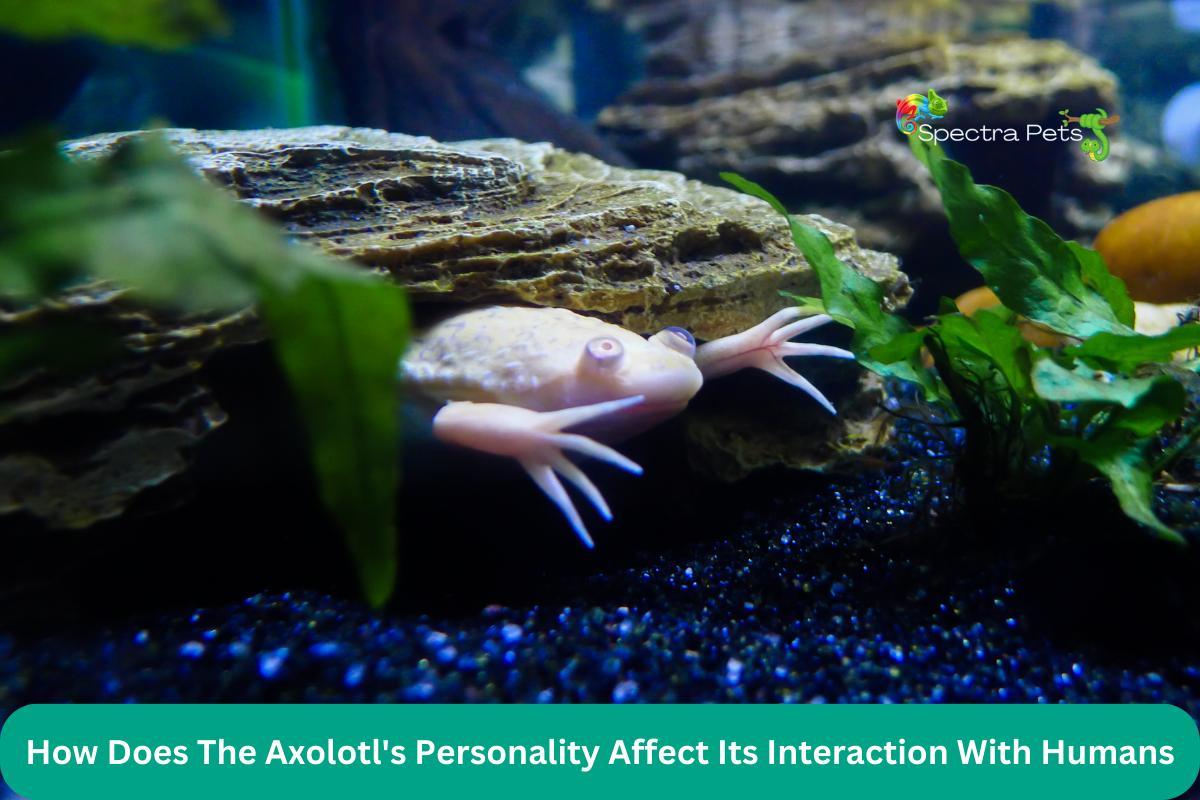
How Can Axolotl Owners Cater to Their Pet’s Unique Personality?
Caring for an axolotl requires understanding its unique personality and adapting to its needs:
- Provide a Suitable Environment: An axolotl’s tank setup should cater to its personality. Active axolotls may need more space and items to explore, while shy ones may appreciate numerous hiding places.
- Tailor Feeding Practices: Aggressive eaters may be more prone to overeating, so portion control is essential. Shy or slow eaters may need patience and a peaceful environment to eat comfortably.
- Minimize Stress: For axolotls that are shy or show signs of stress with human interaction, it’s crucial to minimize handling and create a peaceful environment.
- Regular Monitoring: Regardless of the personality type, all axolotls should be monitored regularly for any changes in behavior, which can be an early indicator of health issues.
How Does an Axolotl’s Personality Change Over Time?
Axolotls, like other animals, may experience changes in their personalities over time. Factors such as age, health, changes in environment, or introduction of new tank mates can all influence an axolotl’s behavior.
For instance, a previously active axolotl may become less explorative with age or due to health issues. Similarly, a shy axolotl might become more outgoing as it grows familiar with its surroundings and human caretaker.
However, sudden or drastic changes in personality may signal health problems and warrant a consultation with a veterinarian.
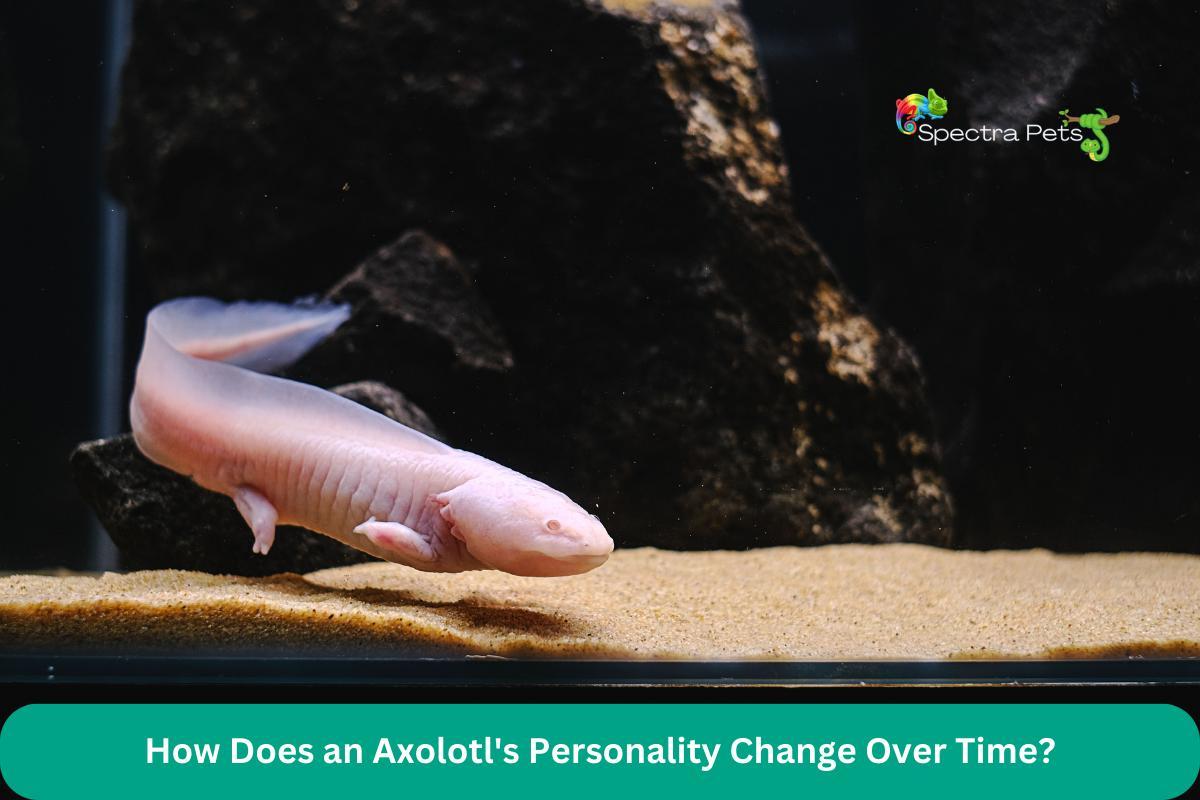
Are Axolotl Personalities Similar to Those of Other Aquatic Creatures?
Axolotls, while unique, do share certain personality traits with other aquatic creatures. For example, their curiosity and exploratory behaviors are common among many fish and other amphibians. Like many aquatic animals, axolotls can also exhibit varying degrees of social behavior and different responses to human interaction.
However, it’s worth noting that axolotls, due to their unique physiology and nature, also possess distinct behavioral traits not found in other aquatic creatures. Their capacity for regenerating lost body parts, for example, can influence their behavior in ways not seen in other aquatic animals.
Conclusion
The wonderful world of axolotls, brimming with unique personalities, leaves us intrigued and in awe. These water-dwelling wonders, each a unique individual, show us that personality isn’t just a human trait. Whether they’re boldly exploring their surroundings or shyly retreating into a corner, each axolotl tells its own tale.
The study of axolotl personalities is a growing field, with researchers continually unearthing new aspects of their behavior. By understanding their personalities, we can not only provide better care for these aquatic marvels but also deepen our appreciation of the complex tapestry of life. So, the next time you see an axolotl, take a moment to ponder – what’s your personality, little buddy?
